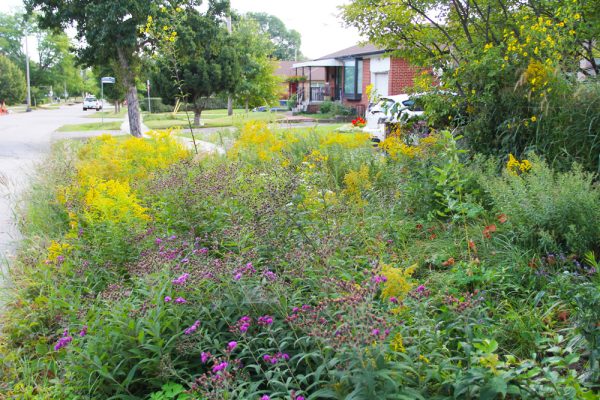An Etobicoke native plant gardener is ordered to cut his “turfgrass and weeds” (he actually has neither) to 20 cm (8 inches). An Annex ecologist is ordered to cut down his oak saplings. A Scarborough native plant gardener is ordered to cut down her rain garden. A Little Italy pollinator gardener is ordered to cut down her “weeds.” A Swansea native plant gardener is ordered to cut down all of her habitat garden.
These are just a few recent examples of bylaw enforcement actions in Toronto targeting those who are tending ecologically beneficial landscapes that look different from conventional lawns and gardens.
Toronto is by no means unique in this. Across Canada, vaguely worded and arbitrarily enforced property standards bylaws place barriers that discourage and/or prohibit residents from creating habitat gardens in support of biodiversity.
The benefits of habitat gardens are clear. They offer food, shelter, and nesting sites for pollinators, birds, and other wildlife; improve air and water quality; reduce erosion and improve soil quality; enhance urban resilience; manage stormwater and reduce flooding; sequester carbon; enhance human health and well-being; and reduce landscape maintenance costs.
These ecologically positive features of habitat gardens align with the progressive policies that many municipalities have enacted with respect to climate change and biodiversity loss. Yet many of these same municipalities also have property standards bylaws (also known as “grass and weeds” bylaws) that work against environmental goals and aspirations.
Habitat gardens demonstrate positive local responses to global challenges. But as long as outdated, anti-ecological bylaws remain in municipal codes, habitat gardens will continue to be mowed down or face threats of removal. Or, at the least, habitat gardeners will continue to face onerous, and uncertain, processes that force them to defend their planting.
In response, the Canadian Society of Landscape Architects, Canadian Wildlife Federation, David Suzuki Foundation, Ecological Design Lab at TMU, and I have launched a national campaign to advocate for the reform of property standards bylaws and enforcement policies and practices in support of biodiversity and community well-being. We have written an open letter to municipalities (PDF) and sent it to municipal staff, mayors, and councillors across Canada. We are encouraging groups and individuals to download the letter and send it to their mayor and councillor(s), as well. As part of this campaign, the David Suzuki Foundation has launched an easy-to-use Action Alert that individuals can use to send an automated letter to their municipal representatives in support of bylaw reform.
Specifically, we’re calling on municipalities to:
- Reform municipal bylaws: Revise existing property standard bylaws that discourage or prohibit habitat gardens, ensuring that new versions support biodiversity and ecological health.
- Initiate bylaw enforcement training: Bylaw enforcement policies and procedures must include training for bylaw enforcement officers on native and prohibited plant identification, essential and permitted habitat features, community relations, and the legal rights of gardeners to express their environmental ethics.
- Lead by example: Insist on a high level of ecological gardening awareness and practice among city employees tending to public gardens, green infrastructure, natural areas, and other lands.
- Commit to community outreach and education: Effective outreach programs are crucial for shifting public perceptions and fostering a deeper understanding of sustainable practices. Municipalities should partner with community leaders and committed organizations to deliver habitat garden resources and events, and install and maintain habitat gardens on public land.
As part of this campaign, we’re convening a national conversation, via a webinar, to take place in late autumn, 2024, in which participants, including municipal representatives, can share the challenges, opportunities and successes of bylaw reform. You can register for details about the webinar.
If you’d like more information about the problems associated with current bylaws, why the work of reforming bylaws is crucial, and existing resources available to help in the reform of these bylaws, we’ve prepared a background report (PDF).
We acknowledge and celebrate the efforts of municipalities to date and offer our encouragement and support to further advance essential bylaw reform and enforcement policies and procedures. We look forward to collaborating with and supporting municipalities working towards enhancing biodiversity within their communities. And we look forward to a time when habitat gardens are supported in their crucial work as local solutions to the twin global crises of climate change and biodiversity loss.
Photo by Douglas Counter.
You can listen to Lorraine Johnson talk about the open letter on the most recent episode of Spacing Radio.
Lorraine Johnson is one of the partners in the national campaign for property standards bylaw reform, and an author of numerous books on native plant gardening, including her most recent, A Garden for the Rusty-Patched Bumblebee, co-authored with Sheila Colla.





One comment
“training for bylaw enforcement officers on native and prohibited plant identification, essential and permitted habitat features, community relations, and the legal rights of gardeners to express their environmental ethics.”
Impossible with the fiscal conservatives in any city hall. They would rather pay minimum wages to someone who know zero about plants or biology.